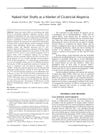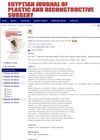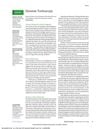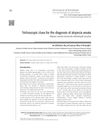
Search
for
Sort by
Research
60-90 / 1000+ results
research Characterization of Lichen Planopilaris in Men: A Retrospective Analysis
Lichen planopilaris in men often affects the scalp, eyebrows, arms, legs, and beard, with many having family members with hair loss.

research Frontal Fibrosing Alopecia and Lichen Planus Pigmentosus
Mycophenolic acid may help hair growth, a combination treatment improves hair thickness in male hair loss, and early treatment of frontal fibrosing alopecia is important.

research Incidence of Cicatricial Alopecia Among New Alopecia Patients Undergoing Platelet-Rich Plasma
6.1% of patients seeking PRP for hair loss had undiagnosed cicatricial alopecia, which PRP cannot treat.

research Outcome of Follicular Unit Extraction in Cicatricial Alopecia
PRP or nanofat injections improve scar tissue quality but don't significantly boost hair transplant results for scarring hair loss.

research Naked Hair Shafts as a Marker of Cicatricial Alopecia
Naked hair shafts are significantly associated with scarring hair loss and may help diagnose it, especially when multiple are found.

research Follicular Unit Transplantation Versus Scalp Expansion in Management of Secondary Cicatricial Alopecia
Both follicular unit extraction and scalp expanders effectively treat secondary cicatricial alopecia, with scalp expanders leading to quicker and denser hair growth.

research Graham Little-Piccardi-Lassueur Syndrome Associated with Androgen Insensitivity Syndrome (Testicular Feminization)
A woman had both Graham Little-Piccardi-Lassueur syndrome, causing hair loss, and complete androgen insensitivity syndrome, making her genetically male but physically female. This suggests androgens don't affect the hair loss condition.

research Cicatricial (Scarring) Alopecia: Clinical Presentations, Etiologies, and Histopathologic Features
Different types of scarring alopecia may be stages of one disease, and accurate diagnosis is crucial to prevent permanent hair loss.

research The Surgical Treatment of Cicatricial Alopecia
The document concludes that surgery is a preferred treatment for cicatricial alopecia, with the method chosen based on individual factors and may require multiple sessions and careful postoperative care.

research Trichoscopic Findings in Various Alopecias at Tertiary Referral Center: A Cross-Sectional Study
Trichoscopy is useful for quickly diagnosing different types of hair loss without needing biopsies.

research Follicular Unit Transplantation for the Treatment of Secondary Cicatricial Alopecia
Hair transplant surgery is a safe and effective way to treat hair loss from scarring in Chinese patients.

research Female-Patterned Alopecia in Teenage Brothers with Unusual Histologic Features
Two teenage brothers had a rare, treatment-resistant form of female-pattern hair loss with unusual scalp changes.

research Treatment-Refractory Central Centrifugal Cicatricial Alopecia Responsive to a Novel Botanical Treatment
A new plant-based treatment was effective for hair regrowth in women with a specific type of hair loss that didn't respond to usual treatments.

research Tumor Necrosis Factor Inhibitors and Janus Kinase Inhibitors in the Treatment of Cicatricial Alopecia: A Systematic Review
Tofacitinib and adalimumab are promising treatments for cicatricial alopecia with few side effects.

research Topical Delivery of Fenugreek Seed Extract Loaded Solid Lipid Nanoparticles Based Hydrogels for Alopecia
Fenugreek seed extract in a nanoparticle gel could be a promising new treatment for hair loss.

research Trichoscopy
Trichoscopy is a useful tool for diagnosing different hair and scalp diseases without surgery.

research Dynamic Trichoscopy: Advancements in Hair and Scalp Examination
Trichoscopy is useful for diagnosing and monitoring hair and scalp conditions over time.

research Two Mouse Mutations Mapped to Chromosome 11 with Differing Morphologies but Similar Progressive Inflammatory Alopecia
Two mouse mutations cause similar hair loss despite different skin changes.

research Skin Biopsy
Correct skin biopsy techniques are crucial to avoid misdiagnosis of skin diseases.

research The Medical and Psychosocial Associations of Alopecia: Recognizing Hair Loss as More Than a Cosmetic Concern
Alopecia is linked to various health and mental conditions, impacts life quality, and needs medical attention beyond its cosmetic effects.

research Artificial Hair Implantation for Hair Restoration
Artificial hair implants can quickly improve looks and life quality, but they have risks like infection and early fiber loss, so more research is needed to confirm their safety and effectiveness.

research Anagen Hair Follicles Transplanted Into Mature Human Scars Remodel Fibrotic Tissue
Transplanting growing hair follicles into scars can help regenerate and improve scar tissue.
research Investigation of Hub Genes and Immune Infiltration in Androgenetic Alopecia Using Bioinformatics Analysis
Immune activities and specific genes are important in male pattern baldness.
research Questionnaire Modifications and Alternative Scoring Methods of the Dermatology Life Quality Index: A Systematic Review
There is a significant need for better-validated quality of life tools in dermatology.

research Trichoscopic Clues for the Diagnosis of Alopecia Areata
Yellow dots and short vellus hairs are key signs for diagnosing alopecia areata using trichoscopy.

research Abstracts from the 17th Congress of the European Society for Dermatology and Psychiatry
The congress showed that psychological therapy can help skin condition patients, social media affects acne stigma, education improves atopic dermatitis, and patient satisfaction in dermatology is high, especially with good doctor engagement.

research Topical L-Thyroxine: The Cinderella Among Hormones Waiting to Dance on the Floor of Dermatological Therapy?
Topical L-thyroxine may help with wound healing and hair growth but should be used short-term due to potential risks.

research Destruction of the Arrector Pili Muscle and Fat Infiltration in Androgenic Alopecia
Hair loss in male pattern baldness involves muscle degeneration and increased scalp fat.

research Trichoscopy in Hair Shaft Disorders
Trichoscopy is a useful tool for diagnosing hair disorders without pulling out hair.